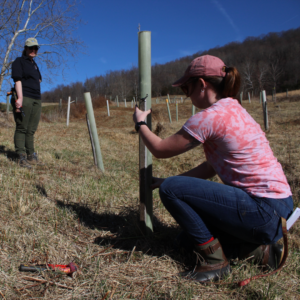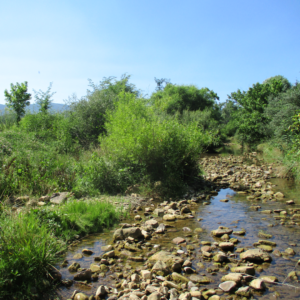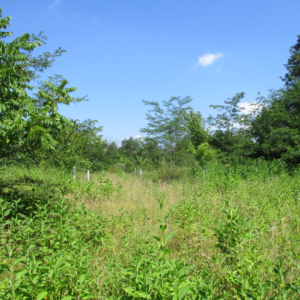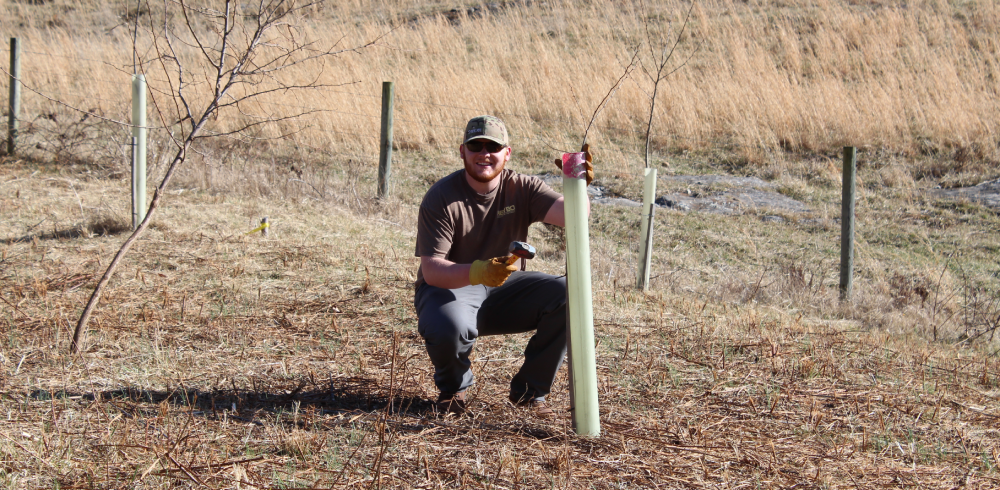 Last summer was the Pilot year for the James River Stewardship Program (JRSP). The JRSP was created by the Upper & Middle James Riparian Consortium, who have a vision of “Growing partnerships to create healthy streamside ecosystems for clean water in the James River today and tomorrow.” One of the problems consistently noted by Consortium partners is that of stewardship of riparian forest buffers.
Last summer was the Pilot year for the James River Stewardship Program (JRSP). The JRSP was created by the Upper & Middle James Riparian Consortium, who have a vision of “Growing partnerships to create healthy streamside ecosystems for clean water in the James River today and tomorrow.” One of the problems consistently noted by Consortium partners is that of stewardship of riparian forest buffers.
JRA, Virginia Department of Forestry, Natural Resource Conservation Service (NRCS), and the Farm Service Agency (FSA), with input from over a dozen Consortium partners, developed the JRSP as the solution to this problem! The goal of the JRSP is to protect the investment in riparian forest buffers, ensure positive examples of practice through stewardship to increase adoption, and provide technical assistance through summer internships. Our 2022 interns, Daniel Mitchell and Jordan Bennett, were able to start this project off strong by assessing over 200 acres across over 25 different buffer sites! It’s been about six months since our 2022 interns finished up for the summer, so what are Daniel and Jordan doing now?
Q: What job do you hold now?
A: Daniel: I just recently began working for Trout Unlimited. I am a conservation crew member working in the Highland County VA area as well as nearby counties in West Virginia. As a conservation crew member I will be doing mostly field work such as building livestock exclusion fences, stream crossings, and building alternate watering systems on properties that directly affect streams and tributaries that are inhabited by native brook trout or at least resourceful to native brook trout.
A: Jordan: I now work as a Restoration Coordinator for the James River Association! I help with the Riparian Consortium team by creating the monthly newsletters, I assist with the James River Buffer Program by organizing volunteers and stewards, and I continue to work with the James River Stewardship Program. I am also able to help with assessments and plantings of different buffer sites!
Q: How did the internship with the JRSP prepare you for the job you have now?
 A: Daniel: I would say that this internship greatly prepared me for my new job. From working in a team setting to understanding what it takes to create, restore, and maintain a healthy stream and riparian habitat, I learned a lot of skills that I now use and look forward to using in the future. It gave me a much better idea of what all goes into the planning, design, and maintenance of riparian buffers, as well as gave me a better understanding of the Conservation Reserve Enhancement Program. This internship also gave me a greater understanding of the roles that different government and private agencies as well as landowners have in making a CREP project work and be successful.
A: Daniel: I would say that this internship greatly prepared me for my new job. From working in a team setting to understanding what it takes to create, restore, and maintain a healthy stream and riparian habitat, I learned a lot of skills that I now use and look forward to using in the future. It gave me a much better idea of what all goes into the planning, design, and maintenance of riparian buffers, as well as gave me a better understanding of the Conservation Reserve Enhancement Program. This internship also gave me a greater understanding of the roles that different government and private agencies as well as landowners have in making a CREP project work and be successful.
A: Jordan: This internship helped me to discover what I wanted to do with my career. I was able to further develop my passion and knowledge for conservation, and helped my understanding of the roles of private/government agencies and how they can work together. I also met some really great people through this internship who I still work with today. I was able to get hands-on experience understanding what a healthy stream and a healthy buffer look like. I was able to further develop communication and teamwork skills that are extremely helpful in the job I have now.
Q: Why would you recommend this internship to someone else?
 A: Daniel: I would recommend this internship to any student interested in working in the environmental field as I learned many skills and information that are applicable to many areas in the environmental field. I gained a greater knowledge of native and invasive plant identification as well as how to manage these species. I also learned what classifies a successful or failing riparian buffer. But perhaps one of the most important things I learned is how to best work and communicate with coworkers, reaching out and communicating with landowners, and planning my weeks out accordingly (scheduling site visits, office hours, etc.).
A: Daniel: I would recommend this internship to any student interested in working in the environmental field as I learned many skills and information that are applicable to many areas in the environmental field. I gained a greater knowledge of native and invasive plant identification as well as how to manage these species. I also learned what classifies a successful or failing riparian buffer. But perhaps one of the most important things I learned is how to best work and communicate with coworkers, reaching out and communicating with landowners, and planning my weeks out accordingly (scheduling site visits, office hours, etc.).
A: Jordan: I would recommend this internship to anyone interested in environmental science, especially to anyone who may not be exactly sure of what they want to do yet. I wasn’t quite sure what I wanted to do with my degree right out of college, but this internship allowed me to find what I am passionate about. Many of the skills I was able to develop are so useful in my current position. I know so much more about both native and invasive species, and how a healthy stream side ecosystem should look. The skills I learned are what got me the position I have now with JRA.

